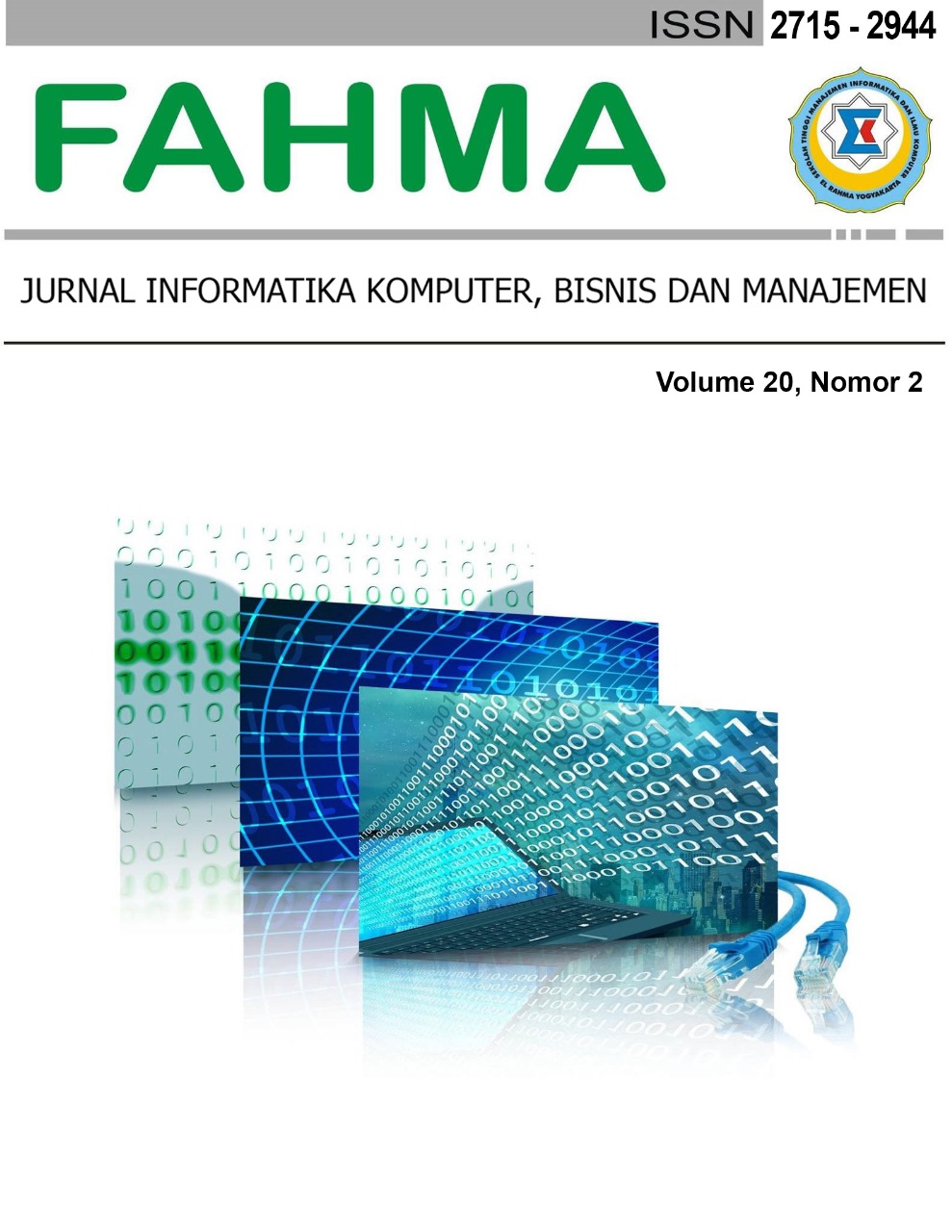Digitalisasi Model Bisnis Sebagai Upaya Perusahaan Menghadapi Dunia Digital
DOI:
https://doi.org/10.61805/fahma.v20i2.34Kata Kunci:
Dunia digital, Model Bisnis, Model bisnis digitalAbstrak
Dunia digital ditandai dengan perubahan ekonomi, perusahaan dan masyarakat menjadi serba digital. Aktivitas ekonomi yang didukung internet, produk menjadi digital serta aktivitas masyarakat yang senantiasa menggunaan internet, menjadikan perusahaan harus menyiapkan diri menghadapi perubahan tersebut.
Digitalisasi bisnis dilakukan dengan tahap: Tampilan organisasi, Komunikasional interaksi, Transaksi komersial, Nilai dan mitra terintegrai. Sedangkan model binis terdiri dari 4 komponen yaitu : Strategi perusahaan, Permintaan pelanggan, Penciptaan nilai.
Digitalisasi model bisnis dilakukan agar perusahaan dapat menghadapi dunia digital yaitu dengan mengelola cara berinteraksi dengan pelanggan (Business to Consumer/B2C). Wirtz mengusulkan model 4C, meliputi: content, commerce, contex dan connection.
Unduhan
Referensi
Efraim Turban., Judy Whiteside., David King Jon Outland., Jae Kyu Lee.,Ting-Peng Liang.,
Deborrah C.Turban., 2018., Introduction to Electronic Commerce and Social Commerce., © Springer International Publishing AG.
Manyika, J., M. Chui, M. Miremadi, J. Bughin, K. George, P. Willmott, and M. Dewhurst Harnessing Automation for a Future That Works. January 2017. Report from the McKinsey Global Institute,.
Toufaily, Elissar & Ricard, Line & Perrien, Jean. (2013). Customer loyalty to a commercial website: Descriptive meta-analysis of the empirical literature and proposal of an integrative model. Journal of Business Research. 66. 1436–1447. 10.1016/j.jbusres.2012.05.011
Olanrewaju, T., K. Smaje, and P. Willmott. “The Seven Traits of Effective Digital Enterprises.” May 2014. Mc Kinsey Company Article,.
Estopace, E. “Singapore Among World’s 7 Most Digital Savvy Countries.” eGov Innovation, July 19, 2016
Sonia San Martín, Blanca López-Catalán, María A. Ramón-Jerónimo, (2012),"Factors determining firms' perceived performance of mobile commerce", Industrial Management & Data Systems, Vol. 112 Iss: 6 pp. 946 – 963. http://dx.doi.org/10.1108/02635571211238536
Ghaziani, A., & Ventresca, M. J. Keywords and cultural change: Frame analysis of business model public talk, 1975–2000. (2005)., Sociological Forum, 20(4), 523–559.
Teece, D. J.. Business models, business strategy and innovation. (2010). Long Range Planning, 43 (2–3), 172–194., https://doi.org/10.1016/j.lrp.2009.07.003
Wirtz, B. W., Göttel, V., & Daiser, P.. Business model innovation: Development, concept and future research directions. (2016a).,Journal of Business Models, 4 (1).
Bernd W. Wirtz., Digital Business Models., Concepts, Models, and the Alphabet Case Study., 2019., © Springer Nature Switzerland AG.
Camarinha-Matos, Luis.. Collaborative Networks in Industry and the role of PRO-VE. (2014).,International Journal of Production Management and Engineering. 2. 53. 10.4995/ijpme.2014.3031
Linder, J. C., & Cantrell, S. Changing business models: Surveying the landscape. (2000). Hamilton.
Anshari, M. 2009. Aplikasi Manajemen Pengelolaan Obat dan Makanan. Yogyakarta: Nuha Medi-ka
Wirtz, B. W.. Electronic business (6th ed.). (2018b)., Wiesbaden: Springer Gabler.
Turban, E., King, D., Lee, J. K., Liang, T.-P., and Turban, D. C.. Electronic commerce: A managerial and social networks perspective. 2015., Berlin: Springer.
Hsu, P.-F., Kraemer, K. L., & Dunkle, D.. Determinants of e-business use in US firms. International Journal of Electronic Commerce., (2006).,10(4), 9–45.
Wirtz, B. W., & Becker, D. Geschäftsmodelle im Electronic Business - Eine Analyse zu Erscheinungsformen, Erfolgsrelevanz und Entwicklungsperspektiven von Geschäftsmo-dellen. (2001).,In Scheer A.-W. (Ed.), Die eTransformation beginnt! (pp. 159–189). Heidelberg.
Twigg, C., & Miloff, M.. The global learning infrastructure. In Tapscott, D., Lowy, A., & Ticoll, D. (Eds.), (1998).,Blueprint to the digital economy (pp. 179–201). New York.
Solaymani, Saeed & Sohaili, Kiomars & Yazdinejad, Esmaeil. Adoption and use of e-commerce in SMEs. (2012).,Electronic Commerce Research. 12. 10.1007/s10660-012-9096-6.
Wirtz, B. W., & Kleineicken, A. Geschäftsmodelltypologien im Internet. Wirtschaftswissenschaftliches Studium (WiSt), (2000)., 29(11), 628–635.
Juma James Masele., Rogers Matama., Individual consumers' trust in B2C automobile e‐commerce in Tanzania: Assessment of the influence of web design and consumer personality., 2019.,John Wiley & Sons Ltd., https://doi.org/10.1002/isd2.12115
Tomasi, Stella & Li, Xiaolin. Influences of Search Engine Optimization on Performance of SMEs:. Journal of Electronic Commerce in Organizations., (2015). 13. 27-49. 10.4018/jeco.2015010103.









